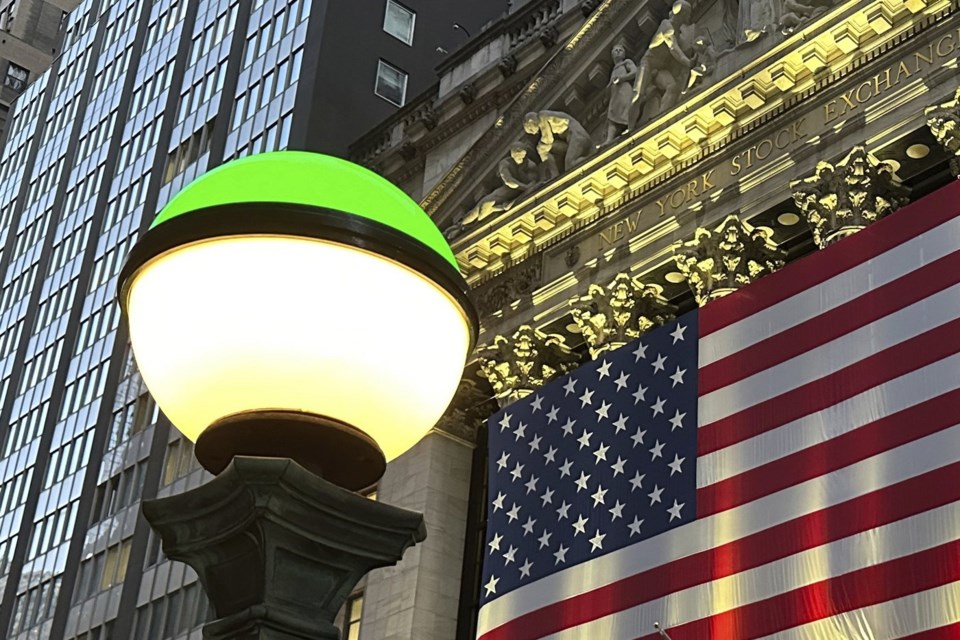NEW YORK (AP) — U.S. stocks are rising as companies report fatter profits than expected, and other U.S. investments are also steadying themselves a day after sliding sharply on worries about President Donald Trump’s trade war and his attacks on the head of the Federal Reserve. The S&P 500 was 1% higher in early trading Tuesday. The Dow Jones Industrial Average was up 396 points, or 1%, and the Nasdaq composite was 1.2% higher. The value of the U.S. dollar also stabilized after sliding against the euro and other currencies, while Treasury yields were holding steadier in the bond market. The price of gold continued to rise.
THIS IS A BREAKING NEWS UPDATE. AP’s earlier story follows below.
Wall Street pointed higher early Tuesday, a day after skepticism about the strength and safety of U.S. investments due to , and his attacks on the Fed Chair Jerome Powell, sent markets sharply lower.
Futures for the S&P 500 rose 0.8% before the bell, far from recovering the loss of 2.4% Monday. Futures for the Dow Jones Industrial Average also rose 0.8% and Nasdaq futures gained 0.9%. Both slumped more than 2% the day before as Trump .
Trump has . Trump Powell “a major loser” and said that energy and grocery prices are “substantially lower" and that the central bank no longer needs to keep interest rates elevated to suppress inflation.
The Fed has , which could reignite after it soared to more than 9% during the height of the COVID-19 pandemic three years ago.
Any attempt to unseat Powell would likely set off a crisis in global financial markets. While Wall Street loves lower rates, largely because they boost stock prices, the bigger worry would be that a less independent Fed could struggle to keep inflation under control. Such a move could further weaken, if not kill, the United States’ reputation as the world’s safest place to keep cash.
Longer-term yields have been on the rise lately with doubts in the global economy. The yield on the 10-year Treasury climbed to 4.43% overnight before settling at 4.39% in the morning. That's still up from 4.34% at the end of last week about 4% earlier this month, a substantial move for the bond market.
The U.S. dollar edged down to 140.24 Japanese yen from 140.80 yen. The dollar has been weakening against the yen and other currencies, and traded momentarily as low as 139 yen on Monday, a 52-week low.
In equities trading early Tuesday, First Solar jumped 7.2% after the Department of Commerce finalized harsher-than-expected solar tariffs on some southeast Asian communities.
Northrop Grumman tumbled 10.6% after it reported that its first-quarter sales fell from a year ago. The military contractor also saw its profit nearly halved as it charged a big loss related to higher manufacturing costs for its B-21 bomber program.
Technology companies, which have taken during the recent market volatility, inched up in premarket Tuesday. Nvidia and Meta Platforms rose less than 1% before the bell.
Meta shares have declined for seven consecutive days, the longest losing streak for the company since April 2023.
One day after plummeting another 6%, Tesla shares inched up less than 1% in premarket ahead of its quarterly earnings report after the bell Tuesday.
Elon Musk's electric car company has already reported that its from the same time last year. That decline occurred against a backdrop of , amid a backlash to Musk’s high-profile role in the White House overseeing a cost-cutting purge of U.S. government agencies.
Tesla shares are down about 40% since the beginning of 2025.
In Europe at midday, France's CAC 40 and German's DAX each declined 0.7%, while Britain's FTSE 100 was mostly unchanged.
Trading was cautious in Asia, where the benchmark Nikkei 225 lost 0.2% to finish at 34,220.60. Australia's S&P/ASX 200 was virtually unchanged, inching down less than 0.1% to 7,816.70. Â鶹ĘÓƵ Korea's Kospi lost nearly 0.1% to 2,486.64. Hong Kong's Hang Seng added nearly 0.8% to 21,562.32, while the Shanghai Composite added 0.3% to 3,299.76.
Trump's tariffs and the retaliatory measures from China hang as a shadow over the region.
"Across Asia, there is undoubtedly a sense of urgency to get to the negotiation table even as striking a deal at an appropriate cost can be tough," said Tan Boon Heng, at Mizuho Bank's Asia & Oceania Treasury Department.
“China’s warning to countries not to resolve U.S. tariffs by striking deals at the expense of Beijing’s interests reveals the geo-economic polarization.”
In energy trading, benchmark U.S. crude gained 93 cents to $63.34 a barrel. Brent crude, the international standard, rose 88 cents to $67.14 a barrel.
—â¶Ä”
Yuri Kageyama And Matt Ott, The Associated Press




